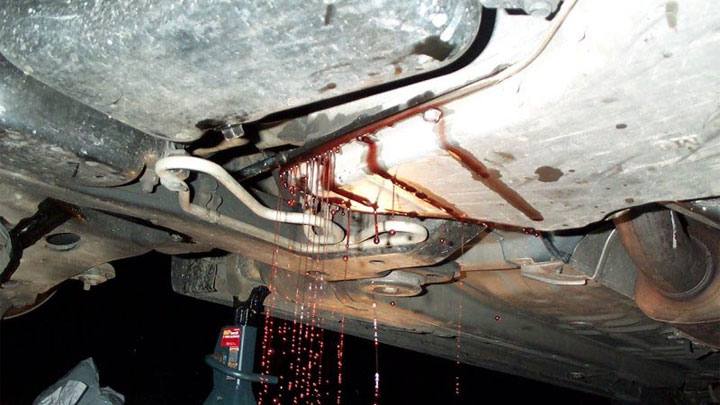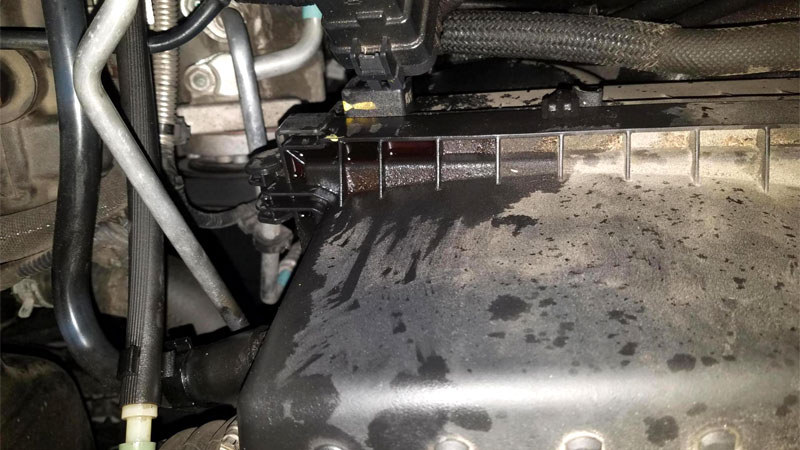Transmission fluid can leak from a variety of different areas in the transmission. The most common sources are worn or loose seals, gaskets and/or O-rings, as well as cracks in the housing itself. Typically, fluid leaks occur at the rear seal where it connects to the driveshaft, around shift linkage connections at the top of the transmission case, and near cooling lines on both sides of the unit.
If a vehicle has an automatic transmission with internal cooler lines, these can be prone to leaking as well due to corrosion or other damage over time. In addition, faulty electrical components such as solenoids may cause issues with pressurizing system parts leading to potential leakage.
Transmission fluid is critical to the performance of any vehicle with an automatic transmission, and a leak can be indicative of serious problems. Transmission fluid leaks are most commonly caused by faulty hose connections and cracked gaskets or seals in the transmission system. In some cases, worn out gears may also cause small amounts of fluid to seep through, so it’s important to have it checked out if you notice any signs of leakage.
Puddle Under Your Car or Truck? How to Diagnose Transmission Leaks
What are the 5 Common Causes of Transmission Fluid Leaks?
Transmission fluid leaks are a common problem in vehicles, and there are several potential causes. The five most common causes of transmission fluid leaks include worn seals or gaskets, damage to the pan or filter, leaking hoses and lines, cracked casings or housings, and loose connections on fittings. Worn seals can be caused by age or incorrect installation; they allow fluid to escape from the system.
Damage to the pan or filter can occur due to corrosion or even during service procedures such as changing the transmission fluid. Leaking hoses and lines can happen for a number of reasons including manufacturing defects, old age wear-and-tear, improper installation, etc. Cracked casings may result from impact damage due to an accident; similarly loose connections on fittings could lead to leakage if not properly tightened after maintenance work is completed.
How Do You Know If Your Transmission Fluid is Leaking?
If you suspect that your transmission fluid is leaking, there are a few signs to look for. The first and most obvious sign of a transmission fluid leak is the presence of red or pink liquid underneath your vehicle. You may also notice an unpleasant burning smell coming from the engine compartment or see smoke rising from it when you start up the car.
Additionally, if your vehicle’s performance has been affected—such as hard shifting, slipping gears, or delayed response when switching between gears—it could be due to low levels of transmission fluid caused by a leak. Finally, another indication that there might be an issue with the transmission is if your vehicle’s temperature gauge rises higher than usual while driving. If any of these symptoms appear, it’s best to have the car inspected by an experienced mechanic as soon as possible in order to prevent further damage and costly repairs down the road.
Does Transmission Fluid Leak When Parked?
In general, transmission fluid leaks can occur even when a vehicle is parked. This could be caused by a damaged seal or gasket in the system, or perhaps due to the accumulation of dirt and debris within the fluid itself. In some cases, it may also be an indication that too much pressure has been applied to the transmission resulting in excessive wear on components such as seals and hoses.
Regardless of the cause, regular inspection and maintenance of a vehicle’s transmission system will help ensure that any potential problems are identified before they become serious enough to result in leaking fluids while parked.
What Would Cause Transmission Fluid to Leak Out?
Transmission fluid leaking out of your vehicle can be caused by a variety of issues, from loose seals and gaskets to worn or damaged internal components. A common cause is a faulty transmission pan gasket that has ruptured or become dislodged. This will allow the fluids to escape, which in turn can lead to other problems such as slipping gears and poor performance.
Other potential causes could include a cracked transmission housing, worn-out axle seals, failing input shaft seal, clogged filter screens and lines, defective torque converters or pressure control solenoids. It’s important to have any suspected leaks checked out right away so you can identify the cause and take appropriate action before further damage occurs.

Credit: automotiveinstincts.com
Transmission Fluid Leak When Parked
If you park your car and notice a transmission fluid leak, it’s important to act quickly. Transmission fluid is essential for lubricating the many moving parts of your vehicle’s transmission system, and if levels become too low, this can cause serious damage to the system as a whole. To prevent further damage from occurring, make sure to have any leaks inspected and repaired by an experienced mechanic as soon as possible.
Transmission Fluid Leaking from Front of Car
If you notice a reddish-brown fluid leaking from the front of your car, it is likely transmission fluid. Transmission fluid leaks are typically caused by worn out seals or gaskets or damage to the main seal. If left unaddressed, this issue can cause major mechanical problems and even lead to failure of the transmission system itself.
It’s important to have a qualified mechanic inspect and repair any transmission fluid leak as soon as possible.
How Serious is a Transmission Leak
Transmission leaks can be a serious issue if not addressed quickly. If left untreated, the leak could lead to major mechanical failure, which would require expensive repairs or even replacement of the transmission. Additionally, running a vehicle with an unchecked transmission leak can result in further damage due to low fluid levels caused by the leaking fluid.
To avoid costly repairs and premature wear on your vehicle’s components, it is important to have any transmission leakage promptly checked out by an experienced mechanic.
Conclusion
In conclusion, transmission fluid leakages can have a devastating effect on your car and should be taken seriously. If you suspect that your vehicle is leaking transmission fluid it’s important to identify the source of the leak and make sure any necessary repairs are made as soon as possible. By taking proactive steps when it comes to maintaining your vehicle’s condition, you can help ensure that it runs smoothly for years to come.



